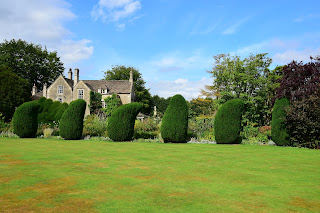Most of the old stone homes had lovely flower boxes or mini-gardens in front.
Of course there was the ubiquitous quaint old church, St. Andrews, with ancient cemetery and more lovely stained glass windows.
This was a lovely little village, great for walking around and peaking through garden gates.
While in Bath we had been told about another old, quaint village called Lacock complete with an abbey. Fortunately it wasn't far from Castle Combe so we decided to add it to your itinerary.
The building includes much of the old religious rooms and the beautiful Cloisters.
After the Dissolution of the Catholic Church by Henry VIII the abbey was sold to a private family and held by the family until it and the surrounding lands, including the village, were given to the National Trust in 1944. During the time it was privately held much of the abbey was renovated as a private dwelling. So the tour was a mix of a medieval Abbey and an opulent private home.
The tour included the large kitchen with large fireplace in which a huge old stove had been inserted.
The tour ended in a grand room with statuary tucked all up and down the walls.
After touring the Abbey we wandered into the village for
lunch at a 16th century pub, the Red Lion Pub (either its is a really popular name or it is a chain of pubs...we saw a lot of Red Lion's).
Fortunately the rains had stopped by the time we finished lunch and it remained dry and occasionally sunny the rest of the day.
Fortunately the rains had stopped by the time we finished lunch and it remained dry and occasionally sunny the rest of the day.
After lunch we walked through the village to see it's quaint streets and shops (and 21st century cars). There are about 30 families still living in the village.
One of the more unusual buildings we saw (meaning we hadn't toured one anywhere else) was the old and very large tithe barn. These barns were used to hold the grain and hay that the villagers and farmers gave to the monastery as their tithes.
Of course this village also had a lovely little church, St. Cyriacs.
One of the more unusual buildings we saw (meaning we hadn't toured one anywhere else) was the old and very large tithe barn. These barns were used to hold the grain and hay that the villagers and farmers gave to the monastery as their tithes.
Of course this village also had a lovely little church, St. Cyriacs.
The ceiling colors were unlike most that we had seen at other churches.
On the way out of the village we stopped by the small garden to tour and talk to some of the gardeners.
On the way out of the village we stopped by the small garden to tour and talk to some of the gardeners.
We decided to head back to Bath after finishing at
Lacock. However, on the way we saw signs
for The Court Gardens (they have gardens evverrrryyyyywhere) so stopped in for a visit. These gardens turned out to be especially lovely with some large lawn areas...
lily ponds...
wildlife and flowers...
gorgeous walkways and alleyways...
lily ponds...
wildlife and flowers...
gorgeous walkways and alleyways...
There was a row of yew trees pruned into very interesting shapes.
We hit the road again, fully intending to get back to Bath. But we got distracted again when we saw signs to Farleigh Hungerford Castle. This castle was started in the 14th century, expanded in the 15th, and sold in the 17th century to pay off gambling debts. It was abandoned in the 18th century and “mined” for the stone to build other buildings so most of the site is ruins.
However, the small chapel and priest’s house that date to the earliest days of the castle were still intact.
We hit the road again, fully intending to get back to Bath. But we got distracted again when we saw signs to Farleigh Hungerford Castle. This castle was started in the 14th century, expanded in the 15th, and sold in the 17th century to pay off gambling debts. It was abandoned in the 18th century and “mined” for the stone to build other buildings so most of the site is ruins.
However, the small chapel and priest’s house that date to the earliest days of the castle were still intact.
There was even a small patch of some of the original wall murals that were in pretty decent shape.
Behind the church was a small stretch of street that looked like maybe it had been restored.
Parts of the old moat or defensive ditch were evident.
Having run out of hours in the lovely sunny day, we headed back to Bath for dinner at a Moroccan restaurant and then headed to the B&B to pack.
Behind the church was a small stretch of street that looked like maybe it had been restored.
Parts of the old moat or defensive ditch were evident.
Having run out of hours in the lovely sunny day, we headed back to Bath for dinner at a Moroccan restaurant and then headed to the B&B to pack.


































































 Previous
Previous Next
Next
No comments:
Post a Comment